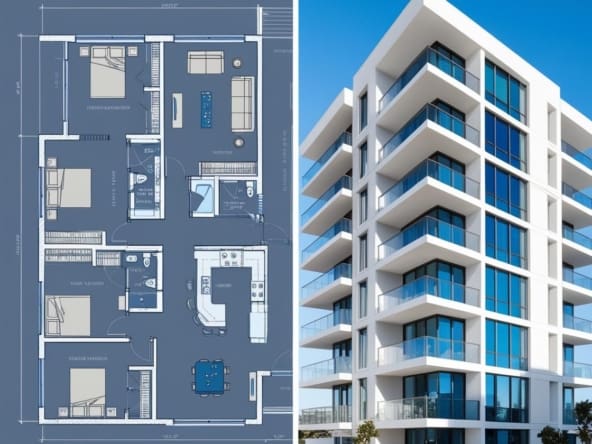Introduction
Welcome to your comprehensive guide to buying property in Thailand! With its beautiful landscapes, vibrant cities, and affordable real estate, Thailand is a top choice for both expatriates and investors. Whether you’re looking for a holiday home, a peaceful retirement spot, or a high-return investment property, understanding the nuances of Thailand’s real estate market is essential.
This guide will walk you through everything you need to know, from legal considerations and financing options to updated market statistics and key insights on rental potential. By the end, you’ll be well-prepared to navigate the Thai property market confidently and avoid common pitfalls.
1. Understanding Thai Property Laws
Navigating Thailand’s legal framework is essential in this guide to buying property in Thailand. Thailand has specific ownership regulations for foreign buyers, especially concerning land ownership, so it’s crucial to be aware of the various legal pathways available.
Foreign Ownership Limits
Foreigners are not permitted to own land in Thailand outright but have alternatives:
- Condos: Foreign buyers can fully own up to 49% of a condominium’s total area, making condos a popular choice for expatriates and investors alike.
- Land Leasing: Foreigners can lease land on a long-term basis, usually for 30 years, with renewal options. This setup is common for villa or house purchases.
- Setting Up a Thai Company: Some buyers establish a Thai company to acquire land, though the company must be majority Thai-owned. This approach requires careful legal compliance to ensure authenticity.
- Usufruct Agreements: Usufruct rights grant foreign buyers the ability to use and enjoy land without ownership. This arrangement can last a lifetime, providing a secure and long-term usage right.
Ownership Types
It’s essential to understand the types of ownership structures for property purchases in Thailand:
- Freehold: Full ownership of the property, typically available for condos.
- Leasehold: Foreigners may lease land for up to 30 years, with options for renewal.
- Condominium Freehold: This permits foreigners to own condos outright within the 49% quota limit, making it one of the most straightforward ownership options.
2. Updated Market Statistics
Understanding the current market statistics is essential when evaluating Thailand’s property market. Here are some figures for 2024:
- Bangkok Condos: Prices in central Bangkok average around 160,000 to 200,000 THB ($4,500-$6,000) per square meter in areas like Sukhumvit and Silom. These prices reflect high demand from expatriates and the capital’s status as an international business hub.
- Phuket Villas: Prices for high-end villas near the beach start around 10 million THB ($280,000) and can reach 30 million THB ($840,000) or more for luxury options. Phuket’s property market is booming due to strong tourism and rental demand.
- Chiang Mai Townhouses: Chiang Mai offers affordable options, with townhouses in suburban areas priced around 3-5 million THB ($90,000-$140,000). Chiang Mai appeals to retirees and digital nomads for its cultural richness and affordability.
3. Financing Options for Property Purchases
Understanding financing options is essential for a successful purchase. While cash is often preferred, other options are available for foreign buyers.
Thai Banks
Some Thai banks, such as Bangkok Bank and UOB, offer mortgages to foreigners under specific conditions:
- Loan-to-Value Ratios: Mortgages for foreigners typically have a lower LTV ratio, ranging from 50-70%.
- Eligibility Requirements: Loans are generally available to foreigners with long-term work permits or Thai spouses.
International Financing
Certain international banks, especially in Singapore and Hong Kong, offer financing for properties in Thailand. These banks may provide better terms, though interest rates and eligibility requirements vary.
Cash Purchases
Cash purchases remain popular among foreign buyers as they simplify the process and often provide a competitive advantage. Cash buyers tend to enjoy faster closings and more favorable prices due to their purchasing power.
4. Selecting the Right Location
Location plays a crucial role in the guide to buying property in Thailand, as each region offers a distinct lifestyle and market dynamics.
Popular Locations
- Bangkok: Known for its modern lifestyle, shopping, and business opportunities, Bangkok offers luxury condos, affordable townhouses, and properties with strong rental demand. Areas like Sukhumvit and Sathorn have high rental yields, averaging around 5-8% annually.
- Phuket: Phuket is ideal for those seeking beachfront villas or luxury condos. Its thriving tourism industry makes it a prime spot for rental properties, with high occupancy rates throughout the year.
- Chiang Mai: Known for its slower pace and affordability, Chiang Mai attracts retirees and remote workers. It offers affordable property options and rental yields averaging 4-6%.
- Pattaya: This beach city has a blend of affordable and luxury properties, drawing holiday homeowners and investors alike.
Property Types
Each property type has unique benefits and rental potential:
- Condos: Ideal for urban locations and preferred by foreign buyers due to ease of ownership. Bangkok condos offer rental yields between 5-8% in prime areas.
- Villas: Often found in resort destinations like Phuket, villas provide privacy and luxury and can be rented to tourists, yielding 8-12% during high season.
- Townhouses: These are more affordable and often located in suburban areas. Townhouses appeal to families and offer moderate rental returns.
5. Conducting Due Diligence
Due diligence is a vital step in this guide to buying property in Thailand, ensuring you’re fully informed about the property’s condition and legal standing.
Property Inspections
Hiring a qualified inspector is essential to assess the property’s structure, check for water damage, and identify potential electrical or plumbing issues. Inspections help avoid unexpected repair costs.
Legal Checks
Work with a property lawyer to ensure everything is in order:
- Title Verification: Confirm that the title deed is clear of any liens or claims.
- Land Office Records: A lawyer can verify the legitimacy of the title deed at the local land office.
Documentation
Ensure all documents are complete and accurate, including title deeds, sale agreements, and any lease contracts. Store copies of all records and communications securely.
6. Understanding the Purchase Process
The purchase process in Thailand includes several key steps:
Making an Offer
Once you’ve found the right property, make a formal offer through your agent. Negotiating on price is common, especially with cash offers.
Sales and Purchase Agreement
After your offer is accepted, sign a Sales and Purchase Agreement (SPA). The SPA should cover all terms, conditions, and contingencies, including payment schedules and repair requirements.
Payment and Deposit
Typically, a 5-10% deposit is required to secure the property. The remaining balance is paid in installments, with the final payment due at the transfer.
Ownership Transfer
The transfer is conducted at the local land office. All final payments, fees, and taxes are settled at this stage. Having a bilingual lawyer present can be invaluable for understanding the paperwork.
7. Common Pitfalls and How to Avoid Them
Understanding common pitfalls can prevent costly mistakes:
- Assuming Foreign Ownership of Land: Foreigners cannot own land outright. Opt for condos, long-term leases, or establish a Thai company only with proper legal guidance.
- Skimping on Legal Assistance: Hiring a reputable lawyer is essential to ensure the property has a clear title and that contracts are compliant with Thai law.
- Ignoring Due Diligence: Conduct thorough due diligence, including property inspections and land office checks, to avoid unexpected issues.
- Overlooking Additional Costs: Property taxes, transfer fees, and maintenance costs can add up. Factor these into your budget to avoid surprises.
8. Taxes and Additional Costs
When buying property in Thailand, be prepared for various taxes and fees:
- Transfer Fee: Typically 2% of the appraised property value, often split between the buyer and seller.
- Stamp Duty: This is 0.5% of the appraised property value, applicable in some cases.
- Withholding Tax: Based on the seller’s income, this tax is applied if the property is sold within five years.
Some sellers may cover a portion of these costs, so clarify responsibilities upfront.
9. Renting Out Your Property and Calculating ROI
If you’re purchasing property as an investment, renting out the property can yield substantial returns, especially in tourist-heavy locations:
- Phuket and Pattaya Villas: High-season villa rentals in Phuket and Pattaya yield 8-12% returns, with occupancy rates above 70% for well-located properties.
- Bangkok Condos: Condos in Bangkok’s prime districts yield around 5-8% per year, with consistent demand from expatriates and professionals.
- Rental Management: Hiring a property manager is beneficial for overseeing rentals, collecting rent, and managing maintenance.
Conclusion
This guide to buying property in Thailand offers everything you need to make an informed decision, from understanding legal considerations and financing options to evaluating rental potential and avoiding pitfalls. Thailand’s real estate market offers diverse opportunities, whether you’re seeking a personal retreat, a high-yield investment, or a retirement home.
With the right team—including real estate agents, legal advisors, and inspectors—you can confidently enter Thailand’s property market and make a smart investment. The Land of Smiles awaits, with its vibrant culture, welcoming community, and attractive property market.



